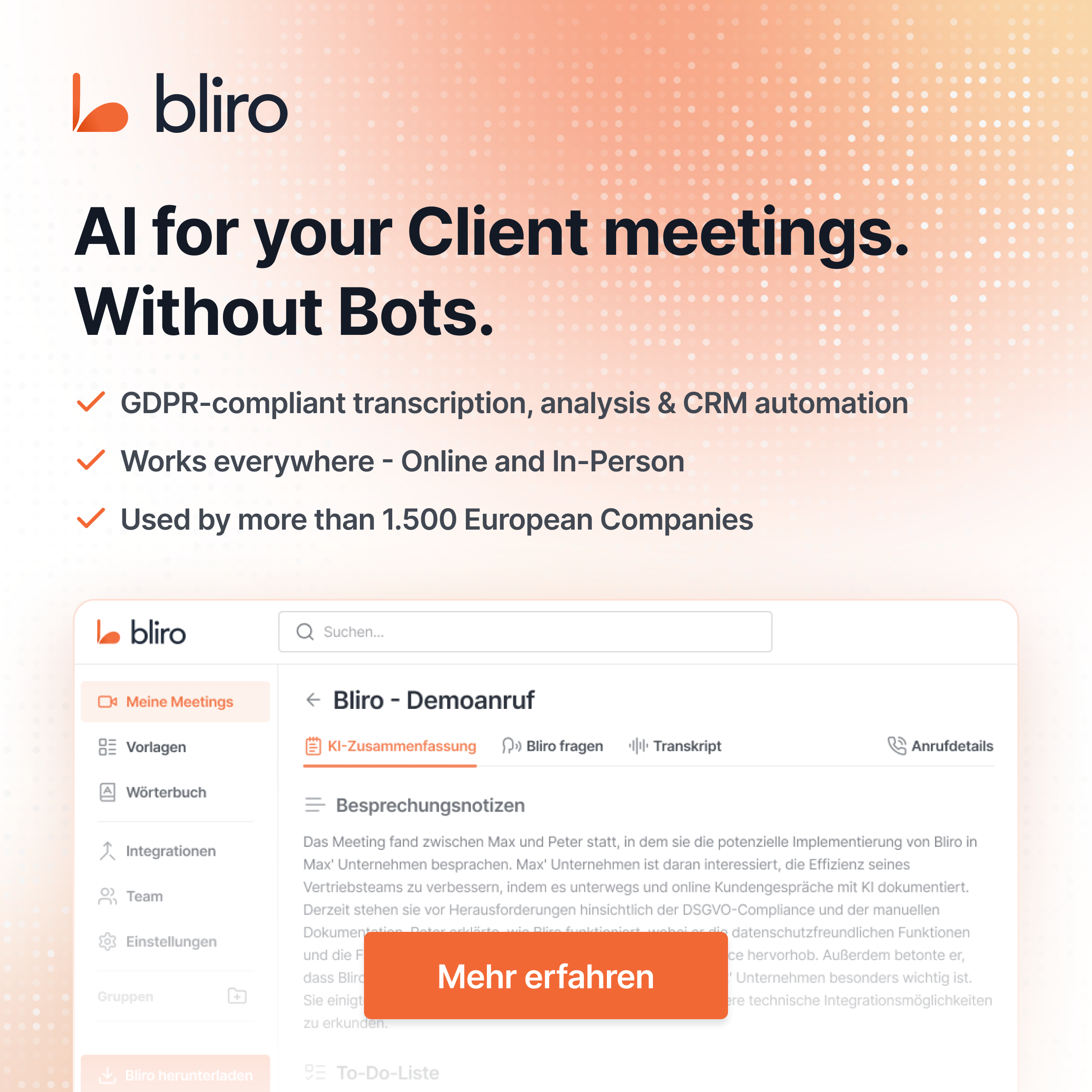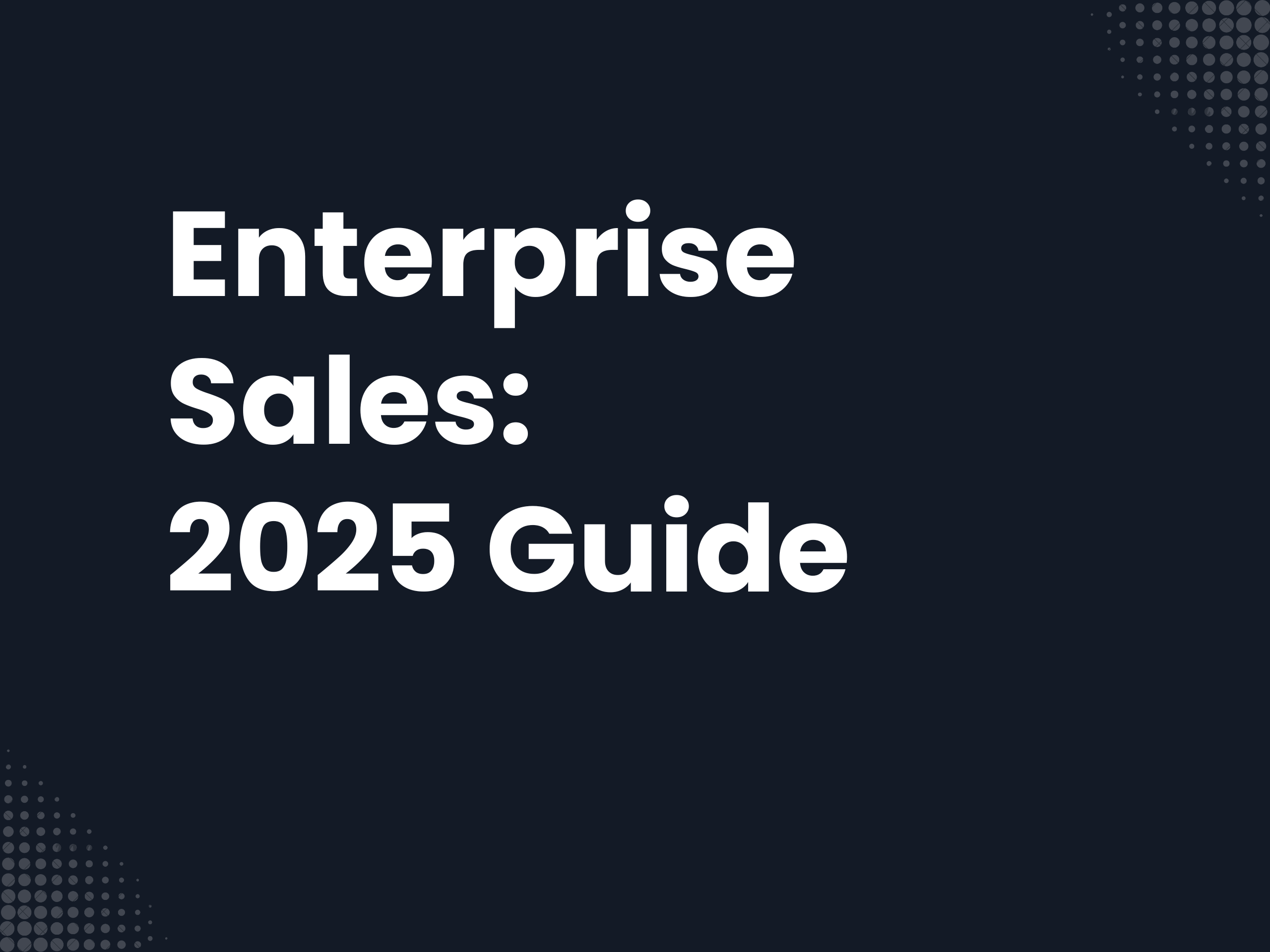Discover how to successfully close even the most complex enterprise deals - despite sales cycles between seven months and a half years. While B2C purchases arise spontaneously, B2B require enterprise decisions strategic patience and methodical approach.
The reality: Every enterprise deal requires at least three internal champions for a successful conclusion. This challenge is further reinforced by complex decision-making processes involving multiple stakeholders. But this is exactly where the opportunity lies - successfully concluded enterprise contracts generate exceptionally high returns, which more than justify the initial effort.
Learn how to systematically master enterprise sales in this practice-oriented guide. From precise target customer identification to proven stakeholder management strategies to modern tools such as Bliro for effective discovery calls - here you will find concrete methods for sustainable sales success in 2025.
Regardless of whether you are a newcomer to Enterprise Sales or an experienced B2B professional: This structured guide gives you the necessary tools to successfully implement even the most difficult major customer deals.

What is enterprise sales?
Enterprise sales means selling to large companies with complex decision-making structures. While SMB deals are often straightforward, enterprise businesses require a strategic approach and deep customer understanding.
Definition and differentiation from SMB Sales
Enterprise Sales is aimed at large companies - typically Fortune 500 or Dax30 corporations or organizations with more than 1,000 employees or an annual turnover of over 0.95 billion euros. This involves business-critical decisions with far-reaching consequences.
The three main differences to SMB sales:
- Time: SMB deals last around three months. Enterprise sales cycles last seven months or longer - sometimes up to 18 months.
- Resources: Enterprise sales tie up more capacities. Sales teams invest significantly more time per prospect; Customer Success requires more extensive onboarding resources.
- Complexity: SMB customers often accept standard solutions. Enterprise customers expect individualized touchpoints, detailed due diligence processes, and profound product adjustments.
Typical features of enterprise deals
Enterprise contracts reach millions of dollars - in some cases comparable to the GDP of smaller European countries. Salesforce's Slack takeover for 26.43 billion euros exemplifies the dimensions of such B2B enterprise deals.
Purchasing decisions involve an average of 6 to 10 employees, each with specific requirements and evaluation criteria. These decision makers only spend 16-17% of their time with vendors. They use the majority for market analyses, competitive comparisons and internal reconciliation.
Enterprise sales often start before product completion - with rough demos and concept presentations. SMB sales only start with a market-ready, independently usable product.
Why enterprise sales means a strategic partnership
Enterprise sales exceed traditional product sales. It involves strategic relationship work - analyze organizational structures, identify fields of application and develop tailor-made implementation strategies.
SMB customers are satisfied with data sheets and standard presentations. Enterprise decision makers expect a comprehensive understanding of their business challenges, market position, and growth goals. You're buying problem solutions, not features.
Long-term relationships form the basis. Sustainable partnerships are created over sales phases lasting several months and often contracts lasting several years. These generate continuous revenue streams and open up growth opportunities.
Tools such as Bliro support complex stakeholder management through structured discovery call documentation and systematic follow-up processes. Automated conversation analysis helps to keep an eye on important details and contacts, especially with complex decision-making structures.

5 steps to a successful enterprise deal: The proven process
Standardised sales processes fail in the enterprise sector. Successful major customer deals follow a specific, multi-stage trial. These five steps will systematically bring you to a conclusion.
1. ICP-based target customer identification
Forget vague target group ideas. Your ideal customer profile (ICP) must be based on hard data, not guesswork. Companies with the highest lifetime value, lowest acquisition costs and potential for brand ambassador status define your perfect ICP.
Analyze systematically:
- Your range of services and their measurable added value
- Characteristics of your most profitable existing customers
- Specific reasons for failed customer relationships to migrate
- Specific pain points and buying motivators
- Realistic budget frameworks and geographical limits
Focus on a maximum of 100 top accounts that are a perfect match for your ICP. This focus maximizes your success rate and prevents wasted resources.
2. Discovery Calls: The art of asking the right questions
Discovery is not a superficial need discussion. You develop profound insights into the customer situation and create the basis for all further steps.
Ask 11-14 specific questions that cover these key areas:
- Compelling event: What drives the customer to invest?
- Urgency: Why now?
- Product fit: Which specific problem are you solving?
- Decision-making process: Who decides how and when?
- Budget: Can your counterpart afford your solution?
Can you describe the customer problem precisely in three sentences? Then you've identified a qualifying deal.
Bliro automatically documents your discovery calls and extracts important insights for your team - without you having to take notes during the conversation.
3. Tailored demos instead of standard presentations
Generic product demos fail in an enterprise environment. Create personalized experiences that are tailored to the exact challenges of the business.
Successful demo strategy:
- Use industry-relevant data and workflows
- Focus on measurable ROI indicators
- Demonstrate concrete time savings and cost reductions
Treat Proof of Concepts as a collaborative partnership. Define success criteria together and establish continuous feedback loops.
4. Mastering negotiations with multiple stakeholders
Enterprise negotiations involve various stakeholders with different interests. Active listening and specific questions effectively steer the conversation.
Use open-ended questions such as: “Can you help me understand this better?” or “What challenges have arisen in the past?”
Demonstrate added value with specific data and references. Stay factual and avoid excessive enthusiasm that could scare off decision makers.
5. Strategic onboarding for long-term success
Nur 2% of all sales transactions Take place at the first meeting. The transition from contract conclusion to onboarding is decisive for the long-term success of the relationship.
Define three onboarding target categories:
- Knowledge objectives: What does the product do and for whom?
- Capability goals: First practical application steps
- Behavioral goals: How will future cooperation work?
Well-thought-out onboarding is not a cost center, but a direct investment in better conversion figures, faster pipeline development and higher customer satisfaction.
3 proven strategies for sustainable enterprise sales success
Structured processes create the foundation - strategic approaches determine the actual success of complex enterprise deals. These three proven strategies will sustainably maximize your closing rates.
Land & Expand vs. Top-Down: Which Approach Is Right for You?
“Land & Expand“ means: Start small, expand big. About a thirds The revenue growth of SaaS companies with a turnover of more than 2.86 million euros comes from expansion transactions - for companies over 14.31 million euros, even over 40%.
The three basic rules:
- Sell gradually, not all at once
- Maximum offers that are too early jeopardize the deal
- Existing customers generate the highest returns
Alternative: The top-down approach is aimed directly at the management level. Particularly successful with product led growth companies. Here, you use engaged end users as “Trojan horses” for larger organizations.
Your decision depends on the size of the company and the type of product. Complex enterprise solutions often benefit from the top-down approach, while SaaS tools can start with Land & Expand.
Account-based selling: quality over quantity
Focus on a few, high-quality target accounts instead of mass. Account-based selling (ABS) focuses specifically on companies that are a perfect match for your ICP.
The measurable benefits:
- Higher conversion rates through personalized communication
- Increased deal sizes through focus on key accounts
- Stronger customer loyalty through intensive relationships
- Better marketing sales coordination
The four-stage ABS process: Identifying ICP-based target customers → thorough research → customized outreach materials → targeted contact with continuous performance measurement.
Tools such as Bliro optimally support ABS through discovery call analyses and stakeholder insights. These insights enable personalized communications from various decision makers within a target account.
Sales playbooks: systematize and scale success
An enterprise Sales Playbook Documents specifically what sales representatives should do in various situations. It systematizes successful sales techniques and makes them available to the entire team.
Specific benefits: Faster onboarding of new employees, centralized processes, shared best practices, and reduced content search times.
The ten core elements of successful Playbooks: company information, product and pricing overviews, sales methods, process descriptions, buyer personas, sales strategies, tool stack, KPIs, messaging guidelines, and sales enablement resources.
For Implementation: Analyze Existing Processes, Define Clear Goals, Put Together the Right Team. Close coordination between sales and marketing plus a deep understanding of buyer personas is crucial.
Important: Playbooks Are dynamic tools that require regular updates. Buying behavior, market trends, and industry dynamics are changing - your playbook must keep up.

Stakeholder Management & Champion Building: People Decide on Enterprise Deals
People decide on enterprise deals - not features or price lists. Successful Stakeholder management and the systematic development of internal champions determine whether complex B2B sales succeed or fail.
Recognize champions and win
Champions act as internal advocates who actively support and drive your solution forward. These key people can make the difference between successful and failed deals. The ideal champion has a high position in the corporate hierarchy and maintains good relationships with key decision makers.
Look for these four core traits of true champions:
- Has Influence and Reputation in the Company
- Benefit personally from the success of your solution
- Understand your product and can communicate its benefits internally
- Ready to navigate your way through internal business policy
In a Discovery Call the key question is: “Is there someone in your company with influence who supports our solution and can help us with internal enforcement?” Bliro can record and analyze such discovery calls to make it easier to identify potential champions and precisely track their statements later on.
Strategically manage 6-10 decision makers
6-10 employees Participate in enterprise purchasing decisions on average - each with specific concerns and criteria. First, understand the four core roles in the buying center:
- Decision Maker: Has the Final Word and Is a Key Person for Your Sales Work
- Influencers: Acts as a Specialist Advisor and Makes Important Recommendations
- User: Works with the Solution Later and Provides Input on Feasibility
- Signator: The final link in the chain without whose consent nothing works
Important note: Your C-level contact person is not always really the decision maker. Depending on internal balance of power, managers can also act as influencers, advocates, or contactors. However, the following applies: “If you can only talk to one person in the customer company, then talk to the decision maker!”
Create organization cards and use networks
Systematic stakeholder mapping categorizes all participants according to influence and interest. This 2x2 matrix helps with prioritization:
- High Influence, High Interest: Your Champions
- High Influence, Low Interest: They Need to Be Convinced
- Low Influence, High Interest: Potential Allies
- Low Impact, Low Interest: Less Priority
Use Stanley Milgram's Insight: everyone Knows everyone else in Maximum six Connections. By networking across departmental and national borders, you can find experts on almost every topic who have already dealt with it.
Proven horizontal strategy: “Since our experience with comparable companies repeatedly results in interfaces with areas X and Y, it often makes sense to involve the decision makers from X and Y right away. What do you think about that?”
Cross-site networking provides insights into parallel projects at an early stage. This improved flow of information forms the basis for departmental or country-wide cooperation - and can give you decisive advantages for successfully concluding an Enterprise Deal.
Overcoming Enterprise Sales Challenges Successfully: 3 Critical Hurdles & Proven Solutions
Even experienced enterprise sellers regularly reach critical limits. The following three challenges often determine the success or failure of complex B2B deals.
Strategically manage sales cycles of 6-18 months
Enterprise sales cycles Extend frequently Over 6-18 months - significantly longer than the 4-6 months of typical B2B software deals. For particularly complex B2B solutions, this process can even take up to 9 months. These time periods are also influenced by budget cycles of large companies.
The risk: During this extended period of time, a lot can go wrong or the business can completely fail. Successful teams therefore rely on systematic documentation and automated follow-ups. Analyze Discovery Calls with tools like Bliro and ensure that important trackings are not lost - crucial for maintaining momentum over months.
Master Security Reviews & Compliance Requirements
Increasing regulatory requirements and more complex business processes are forcing companies to realize their compliance strategies. Today, Enterprise Sellers must master the following areas:
- Industry-specific regulations and their practical effects
- GDPR-compliant data processing and storage
- Compliance with stricter IT security standards
A structured compliance management system is becoming mandatory to demonstrate compliance with applicable laws and ethical standards. In particular, the Supply Chain Due Diligence Act creates new mandatory due diligence requirements.
Enterprise customers expect extensive security reviews and in-depth due diligence processes. Bliro supports the systematic documentation and monitoring of these complex requirements.
Cushion personnel changes & unforeseeable events
Staff changes in customer companies represent one of the biggest threats to ongoing enterprise deals. While new contacts can sometimes open closed doors for years, professionally competent newcomers without emotional connection often lead to Serious Business Slumps.
The solution lies in a diversified stakeholder strategy. Personnel changes shift internal power relations and can jeopardize promising deals. An effective proxy system for customers minimizes these risks. Just as important: structured process documentation within your own team, which supports tools such as bliro through systematic conversation analysis.
Best Practices & Tools for Enterprise Sales 2025
Modern Enterprise Sellers achieve exceptional results through the right combination of tools and data-based key figures. Here are the proven solutions for sustainably successful major customer deals.
CRM & Sales Enablement: The Basis for Systematic Success
Enterprise sales only work with professional CRM systems. Simple contact lists are no longer enough. Leading sales teams use integrated platforms that automatically optimize sales territories, quotas, and incentive strategies.
Sales enablement platforms deliver measurable benefits: shorter sales cycles, higher closing rates, and bigger deals. Companies with Professional Sales Enablement Solutions report impressive results:
- More opportunities generated
- Higher win rates
- More salespeople reach their quotas
These tools create the necessary structure for complex enterprise processes and promote effective collaboration between sales and marketing teams.

Bliro: Automated Discovery Call Analysis for Enterprise Sales
Discovery calls determine success or failure in enterprise sales. Bliro automatically documents important customer information from on-site and online calls and stores it directly in CRM.
Since B2B buying groups spend a lot of time in direct contact with suppliers, precise documentation becomes crucial. Bliro allows salespeople to fully focus on the customer conversation while the system takes care of collecting information.
Particularly valuable: The GDPR-compliant solution ensures consistent follow-ups over the entire multi-month enterprise decision-making processes.
4 enterprise sales KPIs for measurable success
Successful enterprise sales teams measure the right metrics. These four KPIs provide precise information about your performance:
Annual Contract Value (ACV): Average annual turnover per customer contract
Win Rate: Percentage of Successfully Completed Enterprise Deals
Sales cycle length: Time and resources required to close
Net revenue retention rate: customer loyalty and upselling potential
Modern sales teams use real-time dashboards with automatic alerts when quotas are reached and pipeline delays. Mobile access options enable continuous performance monitoring even on the go.
Mastering Enterprise Sales Successfully: Your Path to Sustainable Success with Major Customers
Enterprise sales remains demanding - sales cycles of up to 18 months, complex stakeholder structures and strict compliance requirements require strategic skill. However, these challenges open up exceptional growth opportunities for companies that have mastered the structured approach.
The key lies in a systematic approach. Precise ICP targeting, in-depth discovery processes and tailor-made demos form the basis of successful enterprise deals. Stakeholder management is becoming a core competence - an average of 6-10 decision makers per deal require an individual approach and champion building.
Tools such as Bliro decisively support this process. The automatic documentation of discovery calls and systematic follow-up tracking provide the necessary overview for months-long decision-making processes. Modern CRM systems and sales enablement platforms ideally complement this infrastructure.
Performance tracking using the right KPIs - annual contract value, win rate, sales cycle length and net revenue retention - provides precise information about optimization potential. These indicators should be monitored continuously.
Enterprise sales require higher investments than traditional sales models. However, the return on successful transactions justifies any effort. With structured processes, effective stakeholder management and the right tools, you can master even the most complex major customer deals and take your company to the next level of growth.








